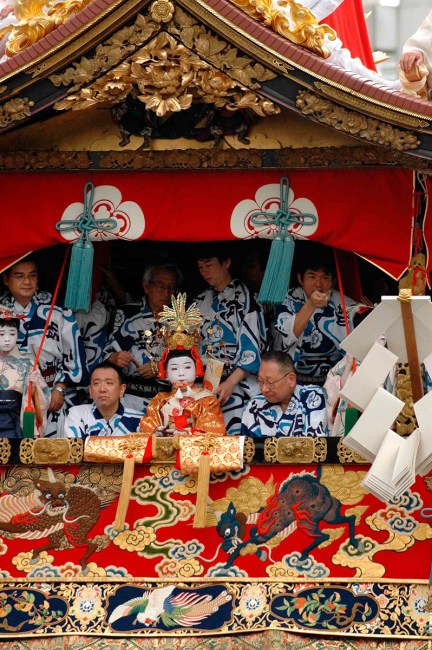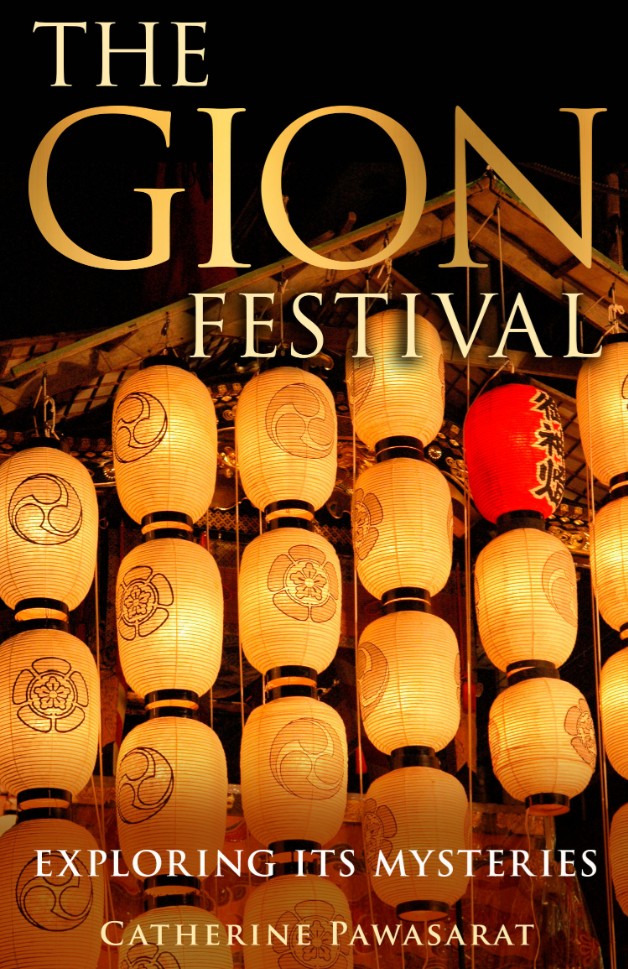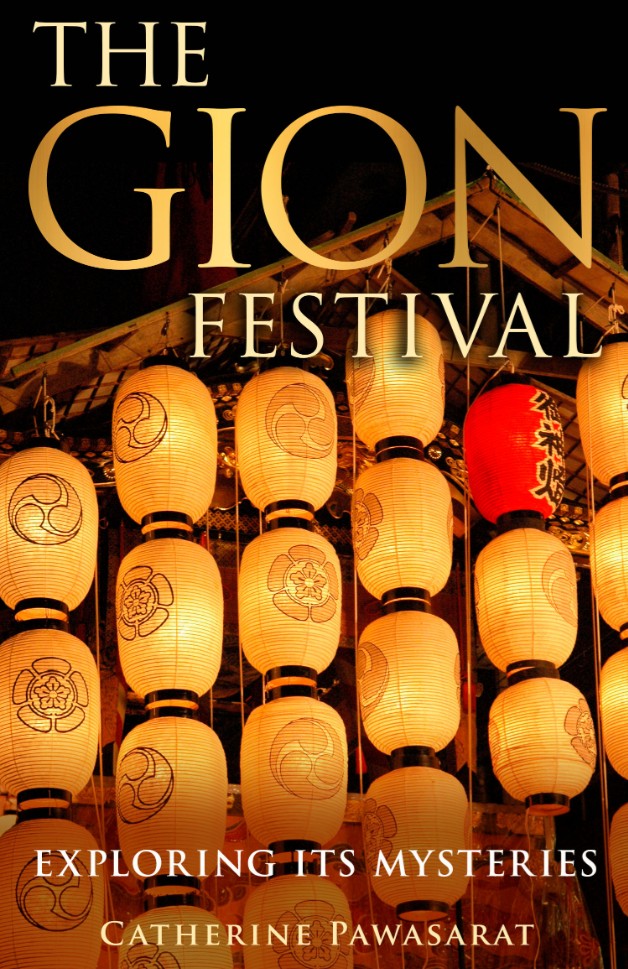Book Endorsements
"The definitive guide to the Gion Festival."
The Gion Festival is the most important annual traditional event in Japan – and one of the richest cultural celebrations anywhere in the world. Yet until now there has never been a book devoted to it in English. Catherine Pawasarat’s book, a labor of love involving decades of experience and research, will remain for many years to come the definitive guide to the Gion Festival.
Alex Kerr, Author of Another Kyoto
"In ground-breaking territory"
At long last, the spiritual, communal, and artistic facets of the magnificent Gion Matsuri are plainly explained in this comprehensive guidebook. The author’s personal knowledge and deep commitment to the sustainability of the festival places this guidebook in ground-breaking territory.
John Einarsen, Founding Editor, Kyoto Journal
"A whole new perspective of the Gion Matsuri that I had never known before."
I grew up immersed in the traditional world of Kyoto culture. But Catherine’s book showed me a whole new perspective of the Gion Matsuri that I had never known before.
Yuka Tsuen, President of Tsuen Tea International, 24th generation tea vendor
"Offers insights into both the beauty and significance of this complex festival."
Catherine Pawasarat’s book offers insights into both the beauty and significance of this complex festival, and in doing so, unlocks some of the mysteries at the cultural heart of this 1200-year-old city.
Diane Durston, author of Old Kyoto, Kyoto: Seven Paths to the Heart of the City, and Wabi Sabi: The Art of Everyday Life.
"A must-have for anyone traveling to Kyoto for the summer festivities."
With background stories on the historical and religious roots of the festival, and detailed information on each individual yamaboko float, as well as links to interactive maps, Pawasarat’s guide to the Gion Festival is a must-have for anyone traveling to Kyoto for the summer festivities.
Marc Peter Keane, garden designer, author of Japanese Garden Notes.
"Never previously available in English, it is an invaluable aid to personal exploration."
This publication is the closest approximation to the as-yet non-existent museum catalog. Providing comprehensive descriptions never previously available in English, it is an invaluable aid to personal exploration. Its maps are detailed, as is the events schedule, and links are provided to a companion website, including YouTube videos.
Ken Rodgers, Managing Editor, Kyoto Journal
About The Book
From the book:
The Gion Festival: A month of rituals, five processions, countless deities, shrines and portable shrines, thirty-four floats, antique treasures and fine arts, otherworldly music, an array of spiritual traditions, family heirlooms on display, kimono, people-watching, thousands of dedicated volunteers, more than 1150 years of history—the Gion Festival is truly a world-class celebration.
Presented annually by thousands of volunteers, the Gion Festival is a fascinating self-organizing institution. With more than a millennium of rich history, it offers an excellent case study for sustainability and community resilience.
From the Kyoto Journal book review:
“The purpose of this book is to raise awareness and appreciation of the unique value of this tradition, as a way of contributing to its long-term survival. A wealth of information is provided on its history, associated events, and how to access specific sites where individual floats and their treasures can be viewed up close in truly astounding detail. Descriptions of their sumptuous decorations, especially textiles (both Kyoto-crafted, and from as far afield as medieval Europe) may inspire even long-term residents to revisit with fresh eyes.”
What’s the festival really about? It’s an enormous Shinto purification ritual. “Shinto” means “Way of the Deities,” or nature spirits. It’s shamanism, Japanese style.
Videos
Interview Videos with Author Catherine Pawasarat
Why did I write a book about the Gion Festival?
Origins of the Gion Festival: Safeguard Against Epidemics
How I Found the Gion Festival
The Gion Festival Community
Sustainability of the Gion Festival
The Gion Festival: A 1150 Year Old Gift to Future Generations
The Gion Festival’s Blue Dragon at Yasaka Shrine
Integrating My Spirituality and the Gion Festival
Catherine Pawasarat also teaches Tantric Buddhism and meditation at Planet Dharma and Clear Sky Center. Watch the videos below to discover her spiritual and personal insights of the Gion Festival.
The Gion Festival as a Shamanic Purification Ritual
What Can Spiritual Practitioners Learn from the Gion Festival?

About the Festival
Experience. Understand. Appreciate.
This 1150-year-old purification ritual celebrates:
The Buddha of compassion
Fearless warrior-monks
A Shamanness Empress
The power of community
A Zen master
Priceless artistic treasures
Nature-mystic monks
About the Author

Catherine Pawasarat is a U.S.-born English and Spanish literature major who went to Kyoto, Japan in 1989, learned the language, and became a journalist, interpreter, translator, and editor. She specialized in sustainability, human rights issues, and traditional Japanese arts.
Her residence in a traditional Kyoto townhouse in the heart of the famous Gion Festival neighborhood in the early 1990s marked the beginning of decades of fieldwork on this gigantic, 1,150-year-old purification ritual and its community.
She lived in the Brazilian Amazon for a year in the late 1990s to study plant medicine. Shortly after she returned to Kyoto, she met Buddhism and meditation teacher Acariya Doug Duncan, and began an intensive spiritual apprenticeship rare in the West. She and Doug Sensei have practiced, taught and trained in spiritual awakening and conscious community through Clear Sky Retreat Center and Planet Dharma since 2005.
Catherine Pawasarat
Follow my Gion Festival social media channels below. You can also email me here.
Access free interactive maps with locations and description of all 34 Gion Festival floats, plus procession routes!

